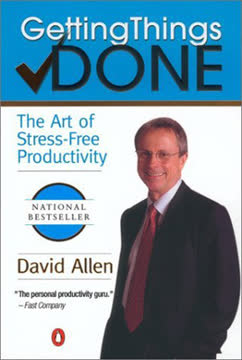Key Takeaways
1. Productivity is about accomplishing more, not doing more
Productivity isn't about how busy or efficient you are—it's about how much you accomplish.
Redefine productivity. In today's knowledge economy, productivity is no longer about how much you produce, but about the value you create. This shift requires a new approach to work and life. Instead of focusing on being busy or efficient, concentrate on accomplishing meaningful goals and creating impact.
Quality over quantity. Prioritize tasks that align with your values and contribute significantly to your objectives. This may mean doing less overall, but achieving more of what truly matters. Consider the Pareto Principle: often, 20% of your efforts produce 80% of your results. Identify that crucial 20% and allocate your resources accordingly.
- Key mindset shift: From "How much did I do?" to "What did I accomplish?"
- Focus on outcomes rather than inputs
- Regularly evaluate the impact of your activities
2. Manage your time, attention, and energy, not just time
When time was "created" by the Big Bang 13.8 billion years ago, the universe had a past, present, and future for the first time.
Three productivity pillars. While time management is important, it's only one piece of the productivity puzzle. Equally crucial are managing your attention and energy. These three elements work synergistically to determine your overall productivity.
Holistic approach. Recognize that each element influences the others. Poor energy management can lead to decreased attention, while strong attention management can make your time more effective. Develop strategies to optimize all three:
- Time: Use techniques like time-blocking and the Pomodoro method
- Attention: Practice mindfulness and eliminate distractions
- Energy: Maintain physical and mental wellbeing through proper nutrition, exercise, and rest
Balance these elements to create a sustainable and effective productivity system tailored to your individual needs and rhythms.
3. Identify and focus on your highest-impact tasks
Not all tasks are created equal; there are certain tasks in your work that, for every minute you spend on them, let you accomplish more than your other tasks.
Prioritize ruthlessly. Regularly assess your tasks and responsibilities to identify those with the highest impact. These are often tasks that align closely with your core goals, leverage your unique skills, or create significant value for others.
Apply the 80/20 rule. Use the Pareto Principle to guide your focus:
- Identify the 20% of tasks that produce 80% of your results
- Allocate the majority of your time and energy to these high-impact activities
- Delegate, automate, or eliminate lower-impact tasks when possible
Regularly review and adjust your priorities as circumstances change. Remember, saying "no" to low-impact tasks is crucial for saying "yes" to what truly matters.
4. Work deliberately and with intention
Productivity isn't about doing more, faster—it's about doing the right things, deliberately and with intention.
Mindful productivity. Approach your work with awareness and purpose. This means being fully present in your tasks, understanding their importance, and aligning them with your larger goals.
Intentional planning. Start each day and week by setting clear intentions:
- Use the "Rule of 3": Identify three main goals for the day and week
- Break larger projects into manageable, actionable steps
- Schedule your most important tasks during your peak energy times (your "Biological Prime Time")
Regularly reflect on your progress and adjust your approach as needed. This deliberate method ensures that your actions are always aligned with your priorities and values.
5. Tame distractions and practice single-tasking
Single tasking is one of the best ways to tame a wandering mind, because it helps you build up your "attention muscle" and carve out more attentional space around the task you are tackling in the moment.
Embrace focus. In our hyperconnected world, the ability to concentrate deeply is a superpower. Cultivate this skill by practicing single-tasking and minimizing distractions.
Strategies for deep work:
- Create a distraction-free environment: Turn off notifications, use website blockers
- Practice the Pomodoro Technique: Work in focused 25-minute intervals
- Build your "attention muscle" through meditation and mindfulness exercises
- Schedule specific times for email and social media, rather than constantly checking
Remember, multitasking is often counterproductive. By focusing on one task at a time, you'll produce higher quality work more efficiently.
6. Cultivate your energy through diet, exercise, and sleep
Although cutting back on sleep saves you time, any amount of sleep you lose below the amount your body requires is not worth the productivity cost.
Holistic energy management. Your physical and mental energy are foundational to productivity. Prioritize habits that support your overall wellbeing.
Key energy boosters:
- Sleep: Aim for 7-9 hours per night, maintaining a consistent sleep schedule
- Diet: Focus on whole foods, stay hydrated, and limit caffeine and alcohol
- Exercise: Regular physical activity improves focus, mood, and overall health
- Breaks: Take regular breaks throughout the day to recharge
Remember, energy management is about sustainability. Short-term productivity boosts at the expense of your health will ultimately backfire. Invest in your wellbeing for long-term success.
7. Be kind to yourself in the pursuit of productivity
Investing in your productivity is a worthwhile goal, but life is too short to not be kind to yourself in the process.
Compassionate productivity. While striving for improvement is admirable, it's crucial to maintain a balanced and kind approach to yourself. Perfectionism and self-criticism can be counterproductive, leading to burnout and decreased motivation.
Strategies for self-compassion:
- Practice gratitude: Regularly acknowledge your accomplishments and blessings
- Set realistic expectations: Aim for progress, not perfection
- Learn from setbacks: View mistakes as opportunities for growth
- Take breaks and celebrate small wins: Recognize the importance of rest and reward
Remember that productivity is a journey, not a destination. By being kind to yourself, you create a positive feedback loop that sustains motivation and leads to greater long-term success.
Last updated:
FAQ
What's The Productivity Project about?
- Focus on Techniques: The Productivity Project by Chris Bailey explores productivity techniques to manage time, attention, and energy effectively. It is based on Bailey's year-long experiment testing various strategies.
- Personal Journey: The book shares Bailey's personal journey, making it relatable and practical. He balances task accomplishment with meaningful activities.
- Framework for Improvement: It provides a framework to focus on high-impact tasks and minimize distractions, emphasizing meaningful outcomes over mere busyness.
Why should I read The Productivity Project?
- Practical Advice: The book offers actionable strategies that can be implemented immediately to enhance productivity, simplifying complex concepts.
- Research-Backed Insights: Bailey's findings are supported by research and personal experimentation, ensuring credibility and reliability.
- Inspiration for Change: It serves as a motivational guide for those feeling overwhelmed, encouraging reflection on values and alignment with productivity efforts.
What are the key takeaways of The Productivity Project?
- Manage Time, Attention, Energy: Productivity involves managing time, attention, and energy, which are interconnected and crucial for meaningful work.
- Rule of 3: This technique involves identifying three key tasks daily, helping prioritize and focus on what truly matters.
- Biological Prime Time: Understanding peak energy periods is essential for maximizing productivity by aligning high-impact tasks with these times.
What is the Rule of 3 in The Productivity Project?
- Daily Focus: Identify three key tasks to accomplish each day, streamlining focus and prioritizing important tasks.
- Weekly Planning: Set three goals for the week to maintain momentum and provide a broader productivity perspective.
- Flexibility and Adaptation: Allows for task adjustments based on energy levels and unexpected events, encouraging deliberate time and effort management.
How does Chris Bailey define productivity in The Productivity Project?
- New Definition: Productivity is defined as "how much you accomplish," focusing on meaningful outcomes rather than mere busyness.
- Quality Over Quantity: Emphasizes achieving significant results over doing more tasks, highlighting the importance of working smarter.
- Personal Relevance: Frames productivity as a personal journey, encouraging individuals to identify what is meaningful to them.
What is Biological Prime Time in The Productivity Project?
- Energy Management: Refers to periods of peak energy and focus, crucial for working on high-impact tasks.
- Personalized Schedule: Each person's prime time is unique, and understanding it allows for better task scheduling.
- Maximizing Productivity: Aligning important tasks with prime time enhances productivity and work satisfaction.
How can I reduce distractions according to The Productivity Project?
- Disconnect from the Internet: Minimizes distractions during high-impact tasks, allowing for deeper focus.
- Set Boundaries: Establish clear work time boundaries, limiting email checks and social media use.
- Create a Conducive Environment: Organize your workspace to minimize interruptions and enhance concentration.
What are some productivity experiments Chris Bailey conducted?
- Meditation Experiment: Meditated for thirty-five hours in a week, finding improved focus and energy levels.
- Ninety-Hour Workweeks: Worked ninety hours in a week, discovering minimal productivity gains compared to a twenty-hour week.
- Smartphone Limitation: Limited smartphone use to one hour a day for three months, leading to greater productivity.
What is the significance of maintenance tasks in The Productivity Project?
- Essential Yet Low-Return: Necessary for productivity but offer low returns on time invested.
- Maintenance Day Concept: Groups low-return tasks together to tackle them at once, freeing time for meaningful work.
- Mindful Multitasking: Engage in low-attention activities like listening to podcasts while performing maintenance tasks.
What are some specific productivity techniques discussed in The Productivity Project?
- The Capture Challenge: Involves a brain dump to clear mental clutter and organize tasks, focusing on what matters.
- Hot Spots Method: Identifies seven key life areas to invest time and energy, helping prioritize commitments.
- Single Tasking: Advocates for single tasking over multitasking for deeper focus and better results.
What role does sleep play in productivity according to The Productivity Project?
- Sleep Deprivation Costs: Highlights significant productivity hindrance from sleep deprivation, losing two hours of productivity per missed sleep hour.
- Quality Over Quantity: Emphasizes consistent sleep schedules and conducive environments for quality sleep.
- Sleep and Energy Levels: Adequate sleep maintains high energy levels, impacting focus and efficiency.
What are the best quotes from The Productivity Project and what do they mean?
- "Just because you feel productive doesn’t mean you actually are.": Reminds that the appearance of productivity doesn't equate to progress, encouraging focus on meaningful work.
- "Without people, productivity is meaningless.": Emphasizes the importance of relationships and social connections in driving productivity.
- "The most productive people are the ones who work deliberately.": Suggests intentionality in work leads to better outcomes, encouraging focus on high-impact tasks.
Review Summary
The Productivity Project receives mixed reviews. Many praise its practical tips, experiments, and comprehensive coverage of productivity techniques. Readers appreciate Bailey's personal experiences and evidence-based approach. However, some criticize the book for lacking novelty, being repetitive, and coming from a privileged perspective. Critics argue that Bailey's advice may not apply to those with demanding jobs or family responsibilities. Despite these criticisms, many find the book engaging and useful for improving productivity, especially for those new to the subject.
Similar Books










Download PDF
Download EPUB
.epub digital book format is ideal for reading ebooks on phones, tablets, and e-readers.






